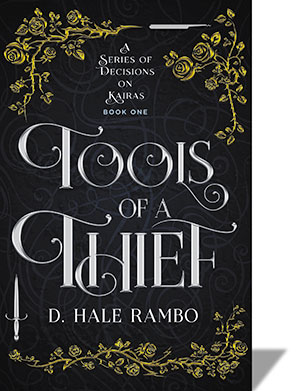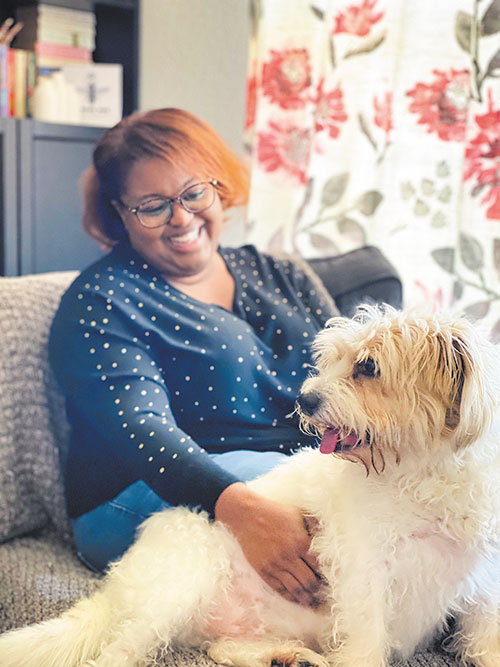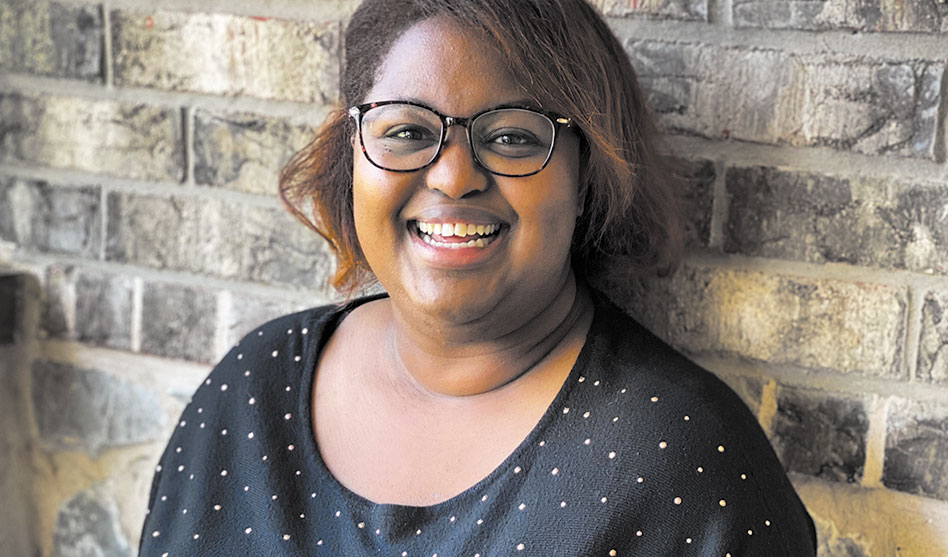D. Hale Rambo’s debut novel puts diversity front and center
D. Hale Rambo describes herself as a “nerdy, book-loving Black woman” who grew up loving to read, but never seeing someone like her as the main character in any of the books she read. Now as an adult, she is combining her love of books, her love of story-telling and her love of the world of Dungeons and Dragons to create stories that bring the diversity of the world — both real and imagined — into leading roles.
The author and Dungeon Master sat down recently to answer a few questions about how the characters of her first book, Tools of a Thief, came to life and why, as a straight woman, she chose to make her main protagonists lesbian.
— Tammye Nash
Dallas Voice: How long have you been involved in the world of Dungeons and Dragons? D. Rambo Hale: I’ve been a player for about eight years and a Dungeon Master for about five — so, not as long as some but longer than others.
 From what I gather, being Dungeon Master basically means setting up a storyline and then guiding the other characters through that story. So it’s very similar to being an author. Do you think that is an accurate statement? And if so, which came first for you — dungeon master or author? I’ve always been an author, or to put it another way, I’ve always told stories. I was involved in theater until my sophomore year in college, and I wanted to be a playwright. I turned towards more digital work when I left college, though, and dropped those dreams. It wasn’t until I got into DnD and then other RPGs [role-playing games] that I felt like I reconnected with all the things I used to love about writing, theater and generally making things up.
From what I gather, being Dungeon Master basically means setting up a storyline and then guiding the other characters through that story. So it’s very similar to being an author. Do you think that is an accurate statement? And if so, which came first for you — dungeon master or author? I’ve always been an author, or to put it another way, I’ve always told stories. I was involved in theater until my sophomore year in college, and I wanted to be a playwright. I turned towards more digital work when I left college, though, and dropped those dreams. It wasn’t until I got into DnD and then other RPGs [role-playing games] that I felt like I reconnected with all the things I used to love about writing, theater and generally making things up.
Being a DM, with homebrew world, is kind of like being an author in the fact that you have a general story, and you know how you want to guide the characters. But, like being a Dungeon Master, none of your players or characters listen to you, and they often spend too much time mucking about with a locked door.
 As an outsider/onlooker, it seems to me that the DnD community in general is much more accepting, but perhaps that is because the players I know are either LGBTQ or allies already. Because I have also heard stories of some very misogynistic and homophobic/transphobic players, too. Do you, as a non-LGBTQ person, find the DnD community to be more open and accepting of LGBTQ people than society in general? I do find the community open, but I and my friends have a few occurrences of misogynistic and homophobic run-ins while gaming, unfortunately. Most of the friends I play with are women, LGBTQ or allies as well. We’ve met a lot of accepting and diverse people within the DnD community at game stores and in DnD-specific groups. But conventions that have open play always have at least one person gatekeeping the game [telling others they are playing the game wrong], and I’ve seen friends who have been disheartened by that. I’ve seen Dungeon Masters who have done this [gatekeeping] by not acknowledging a player’s intentions with their character’s sexuality or how they roleplay social encounters. Or [sometimes] other players at the table belittle choices made by my friends and me in a way that suggests that if we actually “understood” the game, we wouldn’t make those choices. It’s disheartening to come into a space like DnD, where almost everything you do is made up, and be blocked from enjoying a game the way you want because it doesn’t conform to someone else’s standard.
As an outsider/onlooker, it seems to me that the DnD community in general is much more accepting, but perhaps that is because the players I know are either LGBTQ or allies already. Because I have also heard stories of some very misogynistic and homophobic/transphobic players, too. Do you, as a non-LGBTQ person, find the DnD community to be more open and accepting of LGBTQ people than society in general? I do find the community open, but I and my friends have a few occurrences of misogynistic and homophobic run-ins while gaming, unfortunately. Most of the friends I play with are women, LGBTQ or allies as well. We’ve met a lot of accepting and diverse people within the DnD community at game stores and in DnD-specific groups. But conventions that have open play always have at least one person gatekeeping the game [telling others they are playing the game wrong], and I’ve seen friends who have been disheartened by that. I’ve seen Dungeon Masters who have done this [gatekeeping] by not acknowledging a player’s intentions with their character’s sexuality or how they roleplay social encounters. Or [sometimes] other players at the table belittle choices made by my friends and me in a way that suggests that if we actually “understood” the game, we wouldn’t make those choices. It’s disheartening to come into a space like DnD, where almost everything you do is made up, and be blocked from enjoying a game the way you want because it doesn’t conform to someone else’s standard.
So it’s by no means a perfect community, but the more people who join and learn to play, the better it’ll become, I hope.
How do you take a character from the DnD and turn them into the protagonist in your books? What opportunities do you have to expand and improve those characters in books that you don’t have in the game? A lot of writers (or DMs) may laugh, but I use alignment, ideals, bonds, and flaws, specifically 5E — 5E is the proper way to say that the products I’ve made are DnD-compatible without actually saying the words “DnD” or including any suggestion that it is licensed work from Wizards of the Coast, the DnD owners. It’s based on their open gaming license that is used when making DnD-related content and products as a snapshot of a character that I then build on.
It’s a reference I get internally that I don’t have to think too hard on that ignites me. To me, it’s much the same as how some people use the Hogwarts’ Houses.
For example, “Okay, Zizy is chaotic good, and (flaw) she’ll turn tail if she feels she can’t handle what’s going on. How does that impact Laysa/herself?” And then, of course, I put in additional nuances: Why is she scared? What is she running from really? What does she want more than anything and how far is she from getting it?
Because the characters aren’t reacting to PCs [player characters, or characters in the game who are played by a real person, as opposed to a non-PC, which is a character made up by and controlled by the DnD and roles of the dice], who are lovably unpredictable, I can explore their needs deeper. I can showcase more of their quirks, relationships and what they want. Essentially they get to steal the spotlight now in a book.
You can only expand a character so much in a game before you’re making the game all about your story, and [the game should be] everyone’s story — yours, Player 1, Player 2, even Player 3 who can only show up every other session because of real life.
Your protagonist, Zizy, is a lesbian. Why did you choose a lesbian protagonist, and what research did you do to make that character authentic? Zizy is a blend of some of my closest friends who are lesbian, bi and queer. Her relationship with Laysa mirrors relationships I’ve seen firsthand with friends and family. I talked to them about the characters. I asked them to alpha read [reading really rough drafts] and beta read and give me feedback. If there was anything I wrote that felt wrong or didn’t seem plausible, I wanted them to let me know.
When I wrote the characters, it seemed like a natural choice that they would be lesbians. It is a choice — one that I hope allows people to connect and imagine themselves. It’s important to me that people can connect with main characters on that level.
Tools of a Thief comes out May 25. Give me a brief description of the book, and tell me why you think it will appeal to LGBTQ readers, and why it will appeal to DnD folks in general. Tools of a Thief is about a gnome trying to change her life failing, and getting back up again with the help of those she’s met along the way. It’s a character-centric story about finding joy and how sometimes you have to change yourself if you want to keep it. It is Book 1 in the series.
Zizy, Laysa and their relationship will appeal to LGBTQ readers as a fun fresh run as they learn to trust, get to know and brave danger for each other. The world is diverse, the deities are non-binary, and the series overall will have a variety of relationships and people that mirror the real world.
DnD people will love it for the adventures within the overall adventure. The characters explore new places, encounter creatures unknown to them and get into chaotic scrapes — much like many DnD parties when trying to reach their goal.
Tell me about your other work, too. What’s coming up next? “Into the Woods” is a short story I published alongside a [5th Edition] one-shot adventure with the same title on DriveThruRPG and my website. I have a handful of [5th Edition] one-shot modules I’ve published there, including one, based on Jane Austen’s Pride and Prejudice called “The Death of Netherfield Park.”
“A Series of Decisions on Kairas” is the name of the series that Tools of a Thief starts. I thought I was being clever with that name. Tools of a Thief is my debut novel. A fast follow-up will be Components of a Caster, which will continue the story from Laysa’s point of view. She’s been searching for her own sort of power for a while now, and she may have finally found a way in. I’m looking forward to exploring what it means to feel valuable and needed.
Components of a Caster will be released in December 2021.
What else do you want to tell me about that I have not asked about? Creating characters who look like me or share my worldview is important, because I grew up reading and watching characters who looked and acted nothing like me — a nerdy, book-loving black woman. They had grand adventures, while people like me and my friends were stereotypical side characters. It took a few dozen years to even contemplate that I could change that by creating my own content. So, there is literally a post-it on my monitor as a reminder that I can include all different types of people and should. And that’s what really matters.













